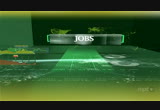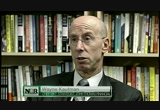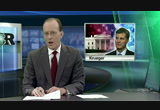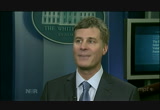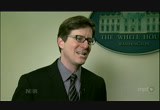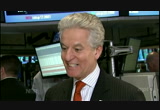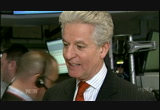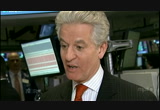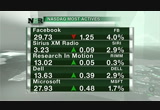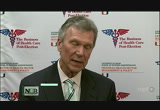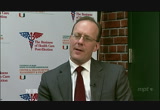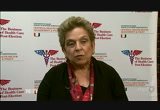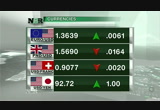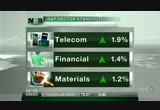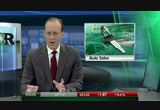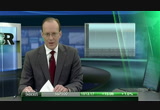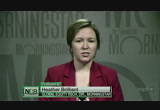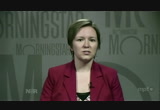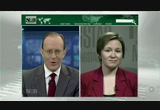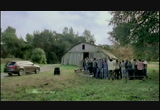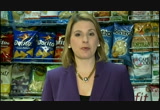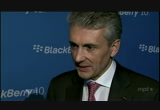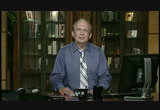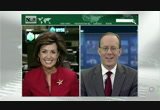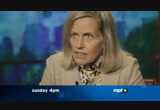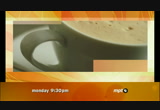tv CBS Evening News With Scott Pelley CBS February 1, 2013 7:00pm-7:30pm EST
7:00 pm
captioning sponsored by wpbt >> this is n.b.r. >> susie: good evening everyone. i'm susie gharib. a red hot day for blue chips: the dow tops 14,000, thanks to positive news on the job market. we talk with white house economist alan krueger. >> tom: i'm tom hudson. it's a best in show on the first day of trading for the stock of the world's largest animal health company. >> susie: also in healthcare, the budget fight and profit potential, as reforms take hold with former senator tom daschle and former health and human services chief donna shalala. >> tom: that and more tonight on "n.b.r." >> susie: february got off to an exuberant start here at the new york stock exchange today. the dow broke through the 14,000 level. it's the first time that's
7:01 pm
happened since before the financial crisis in 2007. traders say the recent rally in stocks could draw in more individual investors into the market. by the closing bell, the blue chips were up almost 150 points to 14,009. the nasdaq jumped 37 and the s&p added 15 points. one catalyst pushing stocks higher: decent data about jobs. american businesses added 157,000 jobs last month but the unemployment rate edged up to 7.9%. even though the january report was a bit disappointing, job growth in the previous two months was revised higher. suzanne pratt has more. >> reporter: stuck in neutral. that seems to be the best cliche for the u.s. job market, right now. the nation's unemployment rate has been lurking just around 8% for the last six months. and, the number of news jobs created is barely keeping pace with population growth.
7:02 pm
still, some economists think the latest labor data is encouraging. >> when we look at the number of jobs being created even though it was a tad below expectations, it was still a healthy number that should continue to help the economy. >> reporter: the main reason for optimism: those positive revisions to november and december jobs data. it turns out, the government underestimated how many positions were added by 127,000. it was that miscount that helped push the dow over 14,000 for the first time in more than five years. and, at 14,000 the blue-chip index is about 150 to 200 points away from its all-time high. market pros like wayne kaufman predict new highs for stocks in coming weeks. >> many investors, retail investors, individual investors are reaching the point of recognition where they no longer believe the economy is going to collapse again, or that the stock market is going to collapse again.
7:03 pm
>> reporter: surely, an improving job market will keep investors jazzed about stocks. to that end, economists expect employers to continue adding about 150,000 jobs a month this year and the unemployment rate to inch lower. >> i think by the end of the year we're probably going to be looking at unemployment rate of 7.5% to 7.4%. certainly not low enough to make the federal reserve happy, but certainly low enough to suggest that we're making progress. >> reporter: progress maybe. but for the millions of unemployed americans, it's progress at far too slow a pace. suzanne pratt, "n.b.r.," new york. >> tom: the outlook for new jobs depends in large part on decisions made in washington in the next two months on spending and taxes. white house economic adviser alan krueger warns the automatic spending cuts known as the sequester could hurt the economy and job growth. washington bureau chief darren gersh spoke with him at the white house just after the employment report came out.
7:04 pm
darren began by asking there's a clear trend in the jobs numbers. >> today's report of 157,000 was a little bit above what the average has been for the previous 12 months, but i think if you look at the whole pattern, we see a job market that's gradually healing. over the last 35 months, our businesses have add 6.1 million jobs. that's moving in the right direction but we have a big hole to dig our way out of because the financial crisis was so deep >> darren: it doesn't look like in the job numbers that the fiscal cliff scared employers from hiring people but that didn't show up. were you surprise bide that? >> i think our economy has been resilient. investment was strong in the fourth quarter particularly in equipment and software. we're seeing signs that the private sector is healing. it's very important that the government doesn't get in the way, that we don't have any self-inflicted wounds such as allowing the sequester to
7:05 pm
indiscriminately cut very important programs >> darren: but the government is raising taxes cutting spending, the payroll tax cut went away. is that the right policy mix to create jobs? >> the president has consistently supported measures to strengthen the economy, to invest more in infrastructure in the short run, to help states and local governments keep teachers and first respond ortz job, the types of-- if you go back and look at what the american proposed in the american jobs act what passed and what didn't pass. what passed has certainly homicide the economy. the 2% payroll tax cut which was intend to be temporary, helped support after-tax income and consumption. in the g.d.p. report we saw 14 quarters in a row of consumption growth. the part that didn't pass would have helped the economy even stronger, to be even stronger >> darren: are we going to hear the president talk about job growth in the state of the union address? >> well, i have worked for the britain long fluff to know not to front-run the state of the union address, but i can tell
7:06 pm
you job growth economic growth is the president's top priority, that moat varktz for example immigration reform. you will continue to hear from the president his vision for strengthening the economy and creating more jobs. >> darren: we have 12 million people who are unemployed right now. how long until we get down to a more normal number? >> i don't want to make a precise forecast. we'll release our forecast with the budget. but i will say that we'd like to strengthen job growth. over eight million jobs were lost by the recession. so there's a deep hole to dig our way out, and it's important we continue in the upward trajectory. >> darren: alan krueger, thank you for talking with us. >> thank you. >> tom: advertisers are spending more than $3.5 million to advertise during the superbowl. >> susie: a new ticker symbol here at the big board: z-t-s. it's zoetis, the animal health division, spun off today from pfizer.
7:07 pm
it's the biggest i.p.o. since facebook went public last year. shares jumped 18% from the offering price of $26. as a stand alone company, the new zoetis will be the largest maker of animal health products in the world. so how's it going to be different now that the company is on its own? that's what i asked ceo juan ramon aliax. >> we have leadership innovation, and quality of products. i think we're max miegz the opportunitieses we have in these marketes, which is growing at steady rates. >> susie: juan it's interesting that the animal health business is a huge industry, and yet investors don't know much about it.
7:08 pm
what is the future? where is growth going to come from? >> two main factors. one is global. the second is the increase of the middle class. all these factors are driving consumption of animal projects. and the second is that more people more middle class also will increase. again great opportunity. >> susie: we know pet owners will pay whatever it takes when it comes to the health of their dogs and cats. there are minimummal generics in this business. customers pay cash. how much pricing power do you have? >> we have been able to increase our prices. i think our prices are based on what we can provide to our customers. it's always understanding that our prices are based on outcomes. so it's a cost-benefit relation. we provide quality products.
7:09 pm
we provide health care to the animals. >> susie: consumers are becoming much more concerned about the use of antibiotics in hir meat. they're going more and more organic. regulators are also calling for limits on the use of antibiotics. how is that going to impact your growth? >> we sell organic products. and we will focus on making sure consumers have the right food and also safe food. and we are operating in an industry which is highly regulated. we partnered with the regulators, the u.s.da, to make sure the products we develop are meeting the needs of animals but also the needs of humans. and we are proud of the quality of our products. >> susie: a nice ral neyour stock today. tell us why investors should consider buying zoetis?
7:10 pm
>> because we have the local presence in developing markets. and we have a unuke portfolio. if one company can be successful, this company will be zoetis. >> susie: i also have to ask you how you came up with the name for the company. a lot of questions of what does zoetis mean? >> zoetis means two things. zoo, which is animal. and zoetic pertaining to life. you combine animals and life, you have zoetis, providing health care to animals.
7:11 pm
>> tom: one out of every seven new jobs created in january was in the health care field. the industry has added jobs every month for almost a decade, but the health care business faces big changes in the year ahead with government budgets under pressure and the reform law taking effect. we spoke with former senator tom daschle and former health and human services secretary donna shalala. shalala is now the president of the university of miami, where we caught up with them today. >> the two of you are veterans of capitol hill budget battles, both in congress and in the white house. how does the budget battle that is ongoing now different, especially in terms of health care? >> well i think there is a growing realization that the entitlement programs comprise one of the largest parts of our budget and have to be addressed if we're going to get some handle on the deficit problem going forward. >> you're part of the fix the debt organization trying to get
7:12 pm
congress to concentrate on entitlement reform. you have said in that capacity, in the end we're going to have to eliminate some programs. could some health care programs be included in that? >> both parties realize that they have to reorganize not simply cut deeply these entitlement programs. they serve a population that's very vulnerable. you have to be careful about shifting costs because they affect poor people and old people and disabled people in very different ways than they do the rest of us who have somewhat growing incomes. >> big transformation from the health care reform law really is next year in 2014, with the individual mandates and the state health exchanges to try to expand the coverage. 23 states have instead said that they want the federal government to run those exchanges. is that good participation? >> some of this may be transitional, to be fair to the states. they're taking on the medicaid population, which is their
7:13 pm
platform that they know a lot about. so my assumption is those 23 will come in over time because for one thing, ideology or not, they do not want the federal government deeply involved in the insurance business they have long been responsible for. >> in a way-- >> a good thing. we've got basically three models today. we've got the models where the states are doing it all. we have the model where's the federal government is going to do it all. and then they've got several model where there will be a hybrid. >> from the political point of view, population the states are turning over to the federal government in the exchanges is a working class population that is much. of the political base of the political system. it's not the poorest people. it's people that get up every day and go to work, don't make a lot of money, and for the most part, who vote. >> one other stakehold they're i want to ask you about and that's the shareholder in for-profit health care companies. is there room for profit in that kind of health care system?
7:14 pm
>> i don't think there's any question that profit when it come cans to new products when it comes to new system when it comes to new services will always be a part of our system as well. >> if you want a robust pharmaceutical industry, which is very dynamic in this country and around the world medical devices, you would go back and say there san appropriate role for the federal government here. it may not be pouring money into health care delivery. it may be investing in basic science and in the innovation that we need in the future particularly those areas that will in the long run improve the quality of health care and the quality of life and drive down costs perhaps in the long run.
7:15 pm
>> tom: the january rally continued with stocks adding to their gains on the back of the job gains and encouraging data on manufacturing. the s&p 500 saw strong buying interest from the opening bell ending up 1%, back over 1,500 at another five year high. trading volume was up 932 million shares on the big board. 2.2 billion traded on the nasdaq. it was an up week for the indices. the dow gained 0.8%, marking its fifth straight week of gains. the nasdaq was up 0.9%. and the s&p 500 added 0.7% this week. leading the sector gains today was the telecommunications sector up 1.9%. the financial and materials sectors added more than 1% each. the two big telecom stocks led the way in that sector. both verizon and a.t.&t. were up more than 2%. they are up after experiencing some pressure thanks to smart- phone subsidies cutting into their fourth quarter profit margins.
7:16 pm
bank of america led the financial sector and was the best dow industrial stock with its 3.4% increase. the bank's mobile and online platforms suffered outages today, blamed on an internal technical issue according to dow jones. the drag on the dow was pharmaceutical company merck. earnings fell from a year ago, but were two cents better than expected. however, the company warned of a possible delay for a new osteoporosis medicine. that comes as shareholders have been waiting for new drugs to help improve profit growth. shares fell 3.3% on heavy volume. the delay could be as much as a year. auto stocks were in focus as january auto sales were strong, especially for the more profitable pick-up truck segment. ford's 22% increase in january sales compared to a year ago led the u.s. based manufacturers.
7:17 pm
g.m. and chrysler sales were up 16% each. it was the strongest january in five years for chrysler. and toyota's u.s. sales climbed 27%. ford and g.m. stocks didn't move much, up a half percent and a third of a percent respectively. but toyota jumped 2.9% to a new 52 week high. meantime, two energy giants reported strong fourth quarter profits. exxon earnings were 20 cents per share above estimates even though energy production dropped. chevron also had better than expected fourth quarter earnings per share, 24 cents above estimates. it was helped by refining cheaper oil, leading to higher profit margins. chevron shares saw the bigger boost, up 1.2%. exxon gained a fraction. four of the five most actively traded exchange traded funds were up. the s&p 500 volatility note fell more than 5%, as it usually moves in the opposite direction of the market. and that's tonight's market focus.
7:18 pm
>> tom: despite the rise in the unemployment rate in january, our friday market monitor thinks the u.s. economy is gaining strength. heather brilliant is the global equity research director morningstar. heather is with us from chicago. still tepid job growth here, healther so what gives you confidence that not only is the economy growth but strength is gathering momentum? >> i think there is a lot of improvement on the manufacturing side of things globally. so you have seen a lot more positive commentary about the situation in europe, how things are going in china. and it's being backed up by manufacturing data improving, so as we've seen that, we really have more confidence that areas
7:19 pm
like the odd otos and housing markets in the u.s. are going to continue to gain steam. >> tom: and you're putting that stat germany to work in energy, particularly natural gas. we have seen natural gas prices down to historic lows. why go natural gas producers with production increasing, presumably putting downward pressure on prices? >> well, they have actually a very interesting portfolio of assets and they've really been paring back their assets lately. their focus is on onshore development of assets that have both natural gas and oil and nave literally haltedly the production of natural gas in favor of oil right now, given the price dinnerrial. buttals we start to see the price of natural gas come back they have a tremendous portfolio of assets they can turn on in a heartbeat. over the long term, over the next five to 10 years, we expect 60% of their production to come from natural gas and we expect the natural gas price to start to come back. >> tom: is this a five- or
7:20 pm
10-year hold for a stock? >> it could be a long-term play. don't get me wrong. but we do expect the stock price to converge roughly in the next three years. we think it's worth 40% more than it's trading. >> tom: you also like gentex they make dimming rearview mirrors and the rearview face pentagon cameras. is this a play on autos? >> tas play on ought owners but it's also a play on againtex, which has a competitive advantage. they have more than 80% market share and only about 20% of companies have auto dimming mirrors right now. there's some regulation that could help them as well. >> tom: then it's got the rearview-facing cameras which i have to admit make me sea sick when i use them but they're awfully helpful in the driveway. >> completely agree on both fronts. >> tom: do you have any positioning in the two stocks we
7:21 pm
mentioned here tonight? >> i do not. >> tom: we have energy and auto parts with heather brilliant, the global equity research director at morning star. >> susie: over a 100 million people are expected to watch the baltimore ravens battle the san francisco 49ers in the superbowl. many people don't just tune in for the football, but also the commercials. so, advertisers are going all out to make sure their spots get a lot of buzz, even before the big game. erika miller reports on whether the multimillion dollar expense is worth it. >> reporter: there are lots of sexy women and plenty of provocative lines. >> and that son is where babies come from. >> reporter: you don't have to wait for game day to watch most superbowl ads. nearly all have been released already, as either a full version or tease. >> don't be no cloud on a sunny day! >> ya, chill winston. >> sir? >> respect boss mon! >> reporter: but you have to wonder-- are the ads worth their
7:22 pm
enormous cost? it's estimated that advertisers are paying at least $3.5 million for a 30-second spot. >> ultimately you have to say does it contribute to driving the business? whilst it isn't the single factor that drives the business. it certainly has been a part of the overall environment that has led to our business doubling in the last three years. >> reporter: advertising during the superbowl also tends to vault a brand to a new level of respect. >> i think the superbowl is a badge for brands. so, if you advertise in the superbowl and you don't screw it up to badly, you've kind of earned the respect of at least people in our business and wall street. >> reporter: all superbowl advertisers hope to see a big jump in sales after their ad airs. but for frito lay's doritoes brand, the success of the campaign also depends on sales before game day. after all, superbowl parties are all about snack foods, which are bought in the weeks leading up to the event.
7:23 pm
doritos started its superbowl campaign six months ago, asking for consumer created ads. viewers will pick one of five finalists to air during the game. >> doritos is a brand about engagement and participation. and so we know that our consumers want to actually have a say in the brand. what's a bigger say in the brand than actually determining the advertising of it? >> reporter: there's good reason advertisers let the public see their commercials before game day. last year, super bowl ads that were released early got over 9 million average views. that compares to 1.3 million views for ads released on game day, according to youtube. one company that has chosen not to reveal anything about its superbowl ad is blackberry. >> it's the best broadcast platform we can have to signal that blackberry is back and show some glimpse of what blackberry 10 is capable of to u.s. consumers so they go and check by themselves. >> reporter: proving that there
7:24 pm
might be some memorable surprises this superbowl game that aren't on the field. erika miller, "n.b.r.," new york. on monday, as we come off the superbowl, "n.b.r.-u." looks at celebrity endorsements and whether they're a good investment for companies and their shareholders. we'll talk with vanderbilt professor steve posavac. you can read about his study online at nbr.com just look for the "n.b.r.-u." tab. >> susie: and finally, some thoughts on paying it forward. this week lou's been thinking about shoes. here's author and educator lou heckler. >> the carolina panthers has had a so-so season despite having a top wide receiver in steve smith. smith has had a bit of a checkered career off the field fighting with teammates in fact, but his athleticism and grace on the field are unmatched. now, he's gaining attention for his shoes. as he has been counseled about his bouts with anger, he has been encouraged to reach out to others instead of boiling over at them. one of the things he decided to do is to donate shoes to people who have none, and he has
7:25 pm
embraced this with the same enthusiasm that he has catching a football. plus, as a symbol of his commitment he removes his football shoes after every game and leaves them there on the field. someone gets a nice par of athletic shoes and a wonderful souvenir. it got me thinking, do i pay lip service to helping others, or am i really committed to a cause? like most of you, i have been blessed in many, many ways. i'm planning on making this year a year where i truly show my gratitude with blatant actions, not words. how about you? does someone you know need a pair of shoes? i'm lou heckler. >> susie: that's "nightly business report" for friday february 1. have a great weekend, everyone and you, too, tom. >> not too many nachos on sunday. >> tom: goodnight, susie. we'll see you online at nbr.com and back here tomorrow night.
107 Views
IN COLLECTIONS
WJZ (CBS) Television Archive
Television Archive  Television Archive News Search Service
Television Archive News Search Service 
Uploaded by TV Archive on

 Live Music Archive
Live Music Archive Librivox Free Audio
Librivox Free Audio Metropolitan Museum
Metropolitan Museum Cleveland Museum of Art
Cleveland Museum of Art Internet Arcade
Internet Arcade Console Living Room
Console Living Room Books to Borrow
Books to Borrow Open Library
Open Library TV News
TV News Understanding 9/11
Understanding 9/11
